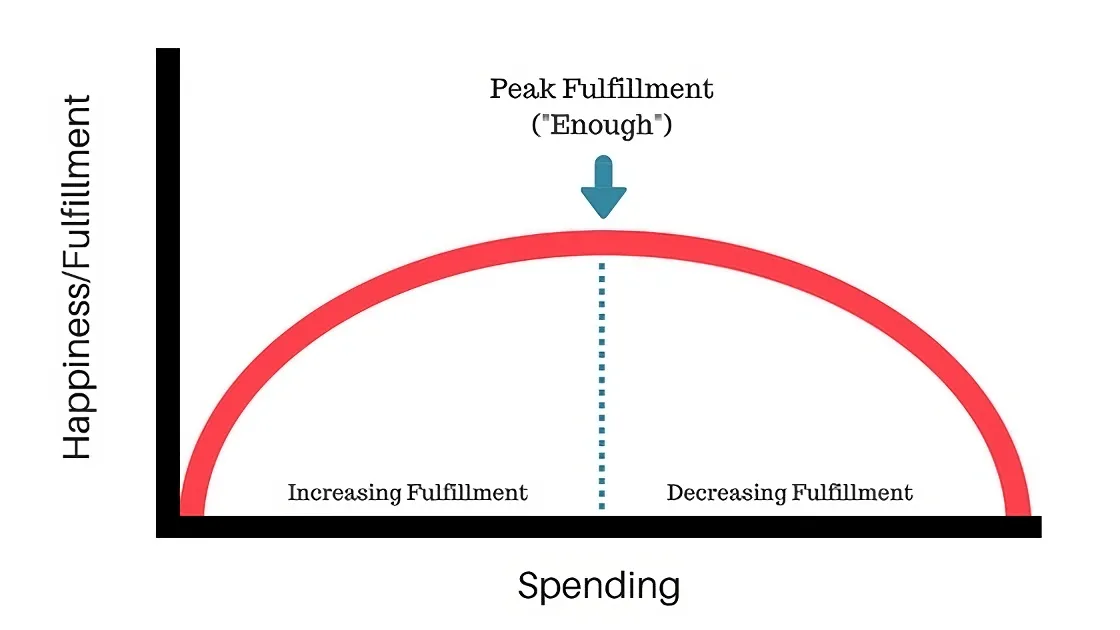Today's Tuesday • 12 mins read
— By Dr. Sandip Roy.
Why be happy when you could be normal, or even a little serious, and still have a great life?
Of course, there’s a certain safety with being normal and semi-serious; it doesn’t rock the boat. You build a steady career, maintain useful relationships, and generally live a life free of major disasters.
Plus, you can buy things to show you’re enjoying life — exotic food, big houses, shiny cars, nice vacations, and trophy spouses. Because, as we all know, money can’t buy happiness, but it’s better to cry in a BMW.
[That BMW quip has a fascinating backstory — the true story of Ma Nuo, the girl who convinced the world that crying inside a BMW feels better. Read about it later in the post.]
You might be thinking at this point:
- I have all I need in life—money, property, relationships, comforts. What’s wrong with having only those?
- Happiness is fleeting, so why try to be happy? A grumpy mood keeps people from trying to steal from me.
- What extra do I get by being happier?
Dive in to find out:
7 Reasons Why Happiness Is Important
When we choose happiness, we open up to deeper connections and a greater appreciation for the world around us. This brings us more health and wealth. It also helps us find meaning and purpose in our short time here on earth.
Not yet convinced?
Read on to find seven compelling scientific reasons why we need happiness in our lives.

1. Happier people earn more.
Do happy people earn more? Yes.
Studies have shown that happy people tend to be more productive and successful in their careers, which leads to higher incomes and more material wealth. They also found people having more money have higher overall life satisfaction.
- This research shows that happier people are more successful across many areas of life—marriage, friendship, income, work, charity, and health. Let’s dive in.
- The United Nations World Happiness Survey, 2015, found that a person’s income is the #1 predictor of their happiness.
- A study from Purdue University in 2018 found that an annual income of $60,000 to $75,000 is the right for day-to-day emotional well-being. Some say that for authentic life satisfaction today, the ideal income is $95,000.
- According to Cornell University economics professor Robert Frank, increasing yearly income is the most significant way to increase happiness.
A little fact: The link between money and happiness is not a straight line, but a curve, or an inverted U.

In other words, more money doesn’t always mean more happiness.
- When you’re struggling to meet your basic needs, an extra dollar can make a big difference in your quality of life and overall well-being.
- But as income rises, the curve starts to flatten out. Once you reach a certain level of income, extra wealth doesn’t translate to proportional increases in happiness.
- At the very highest levels of wealth, the curve can even start to slope downward slightly. Extreme wealth can bring its own set of challenges, like increased stress, isolation, and loss of purpose.
In fact, there’s evidence that a poor person is about 0.80 (or 80%) as likely to be satisfied with their life as a richer person (Diener & Diener, 2002).
2. Happier people get more success.
Do happy people get more success? Yes.
Happiness doesn’t just follow success — it can actually precede and contribute to it. People who experience more positive emotions are more likely to achieve their goals and ambitions.
Success does not make us happy; rather, being happy makes us successful.
Happier people are more likely to ace job interviews and secure better jobs.
- They are evaluated more positively by superiors on a job, show higher performance and productivity, and handle managerial positions jobs better.
- Happiness also makes you more productive and improves your ability to problem-solve.
- Economists at Warwick University found people primed to feel happy in an experiment turned out to be 11% more productive.
- In a job, a happy person is more likely to succeed better. They are also less likely to show disruptive behavior and work burnout.
- A study by Forbes shows happy employees call in sick 66% less.
Optimism can cut the risk of heart disease by half. This study led by Dr. Laura Kubzansky found that emotional vitality—a sense of enthusiasm, hopefulness, engagement in life, and the ability to face life’s stresses with emotional balance—reduces the risk of coronary heart disease.
[Emotional vitality = a sense of enthusiasm, hopefulness, and engagement in life]
3. They help others more.
Do happy people help others more? Yes.
Happiness inspires generosity and altruism. Happy people are more inclined to volunteer, donate to charity, and are more likely to help those in need. They are, as scientists would call them, more prosocial.
They volunteer more often than their unhappy friends and colleagues for charity and community service groups, such as religious, political, health-related, and educational organizations.
Studies suggest people who volunteer to help have better health and more happiness than those who do not. We feel good when we help others with our time, money, or other resources.
According to a study in Social Science & Medicine, a person who volunteers more than once a month, but less than once a week, is 12% more likely to report being very happy. A person who volunteers weekly is 16% more likely to report they are very happy.

4. They are more resilient.
Are happy people more resilient? Yes.
Happiness provides a buffer against stress and adversity. People who cultivate joy and positivity are better equipped to bounce back from life’s challenges.
Resilience is our “bouncing back” capacity. It defines how fast and well we can recover from our difficulties.
The happier people bounce back from misfortunes and hard times faster and emerge stronger.
Happiness is about being able to make the most of the good times—but also to cope effectively with the inevitable bad times, to experience the best possible life overall.
To be happier, learn how to pick yourself up after a fall, come back strong after a failure, let go of negative feelings people heap on you, and find the resilience to come back stronger.

5. Happier people have better health.
Do happy people have better health? Yes.
Happiness is linked to a stronger immune system, lower blood pressure, and reduced risk of chronic illness. It can even extend our lifespan.
They have better physical health and report fewer unpleasant physical symptoms.
The happier people visit the emergency room and hospitals less frequently, make fewer calls to the doctor, use less medication, and have a lesser number of work absences. They also experience less pain.
Happier people are mentally healthier than their less happy social group members. They have fewer symptoms of mental diseases, such as hypochondriasis, schizophrenia, social phobia, anxiety, or depression. Happier people are also less likely to report a history of drug abuse.
Happiness not only feels good, but it also comes first. If you are happy, you are more likely to start and stick to a healthy exercise habit. And in return, exercise makes us happier.
Healthy people are not happier. The reverse is true: happy people are healthier.
— Heli Koivumaa-Honkanen, Life Satisfaction and Suicide: A 20-Year Follow-Up Study
6. They have better marriages.
Do happy people have better marriages? Yes.
Happiness in a relationship goes hand-in-hand with greater intimacy, trust, and overall relationship satisfaction.
Happier people have more satisfaction in their marriages.
Researchers have found that there is indeed a strong relationship between happiness and satisfaction with marriage and family.
Happier people, who are either married or in committed relationships, more often describe their partner as their “great love” than their less happy friends.
Waite and Gallagher in their book The Case for Marriage: Why Married People are Happier, Healthier and Better Off Financially suggest happiness or life satisfaction of married individuals is higher because spouses provide emotional support and a sense of a greater purpose or meaning to life.
The marriage partnership allows for economic and emotional specialization. It also provides easy access to an available partner.
7. Happier people have better relationships.
Do happy people have better relationships? Yes.
Beyond just romantic partnerships, happiness fosters deeper connections with friends, family, and community. Good relationships are the number one thing that helps us survive and thrive.
Happier people have more friends and better social support, and also, they are also more satisfied with their friends and their group activities.
The top 10% of the happiest college students, in a study, were found to have high-quality relationships. The happiest students were less jealous and had stronger contact with their family members.
This is what Shawn Achor, the New York Times bestselling author of The Happiness Advantage and Before Happiness, whose TED talk is one of the most popular, with over 11 million views, says:
My empirical study of well-being among 1,600 Harvard undergraduates found a similar result—social support was a far greater predictor of happiness than any other factor, more than GPA, family income, SAT scores, age, gender, or race. In fact, the correlation between social support and happiness was 0.7. This may not sound like a big number, but for researchers it’s huge—most psychology findings are considered significant when they hit 0.3. The point is, the more social support you have, the happier you are.
— Shawn Achor, positive psychology advocate who has lectured at over a third of the Fortune 100 companies
What Matters For Happiness
The following extract from the peer-reviewed research article The Keys To Happiness is significantly relevant:
Studies have shown that prioritizing time more highly than money is positively associated with happiness. Individuals may choose to allocate more of their time to making money, but often do so at the expense of neglecting social relationships (spending time with family, friends, and the community).
It has been discussed that prioritizing time over money is beneficial for happiness because it can improve the quality of social relationships.
Prioritizing social relationships, including family, friends, and neighbors, was associated with a greater likelihood of happiness, whereas prioritizing extrinsic achievements, such as money and power, or physical self (i.e., health) was adversely associated with happiness.
Respondents prioritizing religion (spirituality) were most likely to report happiness, whereas respondents prioritizing extrinsic achievements were the least likely.
It is likely that people who consider extrinsic achievements as the most important thing in life are less likely to be satisfied with their current achievements and less likely to invest in social relationships, such as family and friends.

Now, Ma Nuo’s story.
Is It Really Better To Cry In A BMW?
In March 2010, on the popular Chinese matchmaking show Feicheng Wurao (If You Are The One), a jobless suitor asked an 18-year-old Ma Nuo if she would go on a date to “ride a bicycle with him.”
Her reply came swift and sharp and made her an overnight sensation. Ma Nuo said:
I would rather cry in a BMW than laugh on a bicycle.
The incident sparked a debate over whether a woman could openly suggest that a man’s worth is solely a measure of his financial status.
With that, Ma Nuo gave the world its most memorable definition of materialism. A materialistic person is someone who highly values material things, including money and status symbols, more than spiritual or intellectual pursuits.
Now, if we look deeper, we find a niggling question underneath that aphorism:
Is it really joyful to cry in a BMW?
After all, the slogan of the company is: Joy is BMW.
Is it painless to cry in a BMW, Mercedes, or Audi?
No. The root question behind that is: Why do you need to cry when you are inside a BMW?
Because the struggles that bring you to tears don’t care where you’re placed in life. You can have all the luxuries you want and still have moments of pain.
Crying is a truly human experience that transcends wealth and status. The rich and the famous cry. The strong and the influential cry. Their tears may not always show, but they also cry—even if on the inside.
Life can make you cry, whether you live in a villa or a shanty. That is the authenticity of life.
So, the real questions are:
- Did Ma Nuo have tears dammed inside, but did not want the world to see her cry?
- Did she think that laughing on a bicycle would be fake, masking her inner sadness?
- Did she want to tell the world she is doing great, while she weeps inside a shiny car?
[BMW is short for Bayerische Motoren Werke AG, the German luxury vehicle company.]
Final Words
So, do we need to have happiness in our lives? Short answer: Yes. Science shows that being happy is a high-priority business in life.
Three takeaways:
- Create happy memories with those you care about. A picnic in a local park may be more fun than an expensive, quiet dinner.
- Give back a little. Volunteer at places that match your values, like helping at a food bank, or mentoring youth.
- Set aside time for self-growth. Read books, attend workshops, or practice mindfulness to thrive beyond material success.
√ Also Read: The Secrets of Money And Happiness, From Science.
√ Please spread the word if you found this helpful.
• Our Story!


